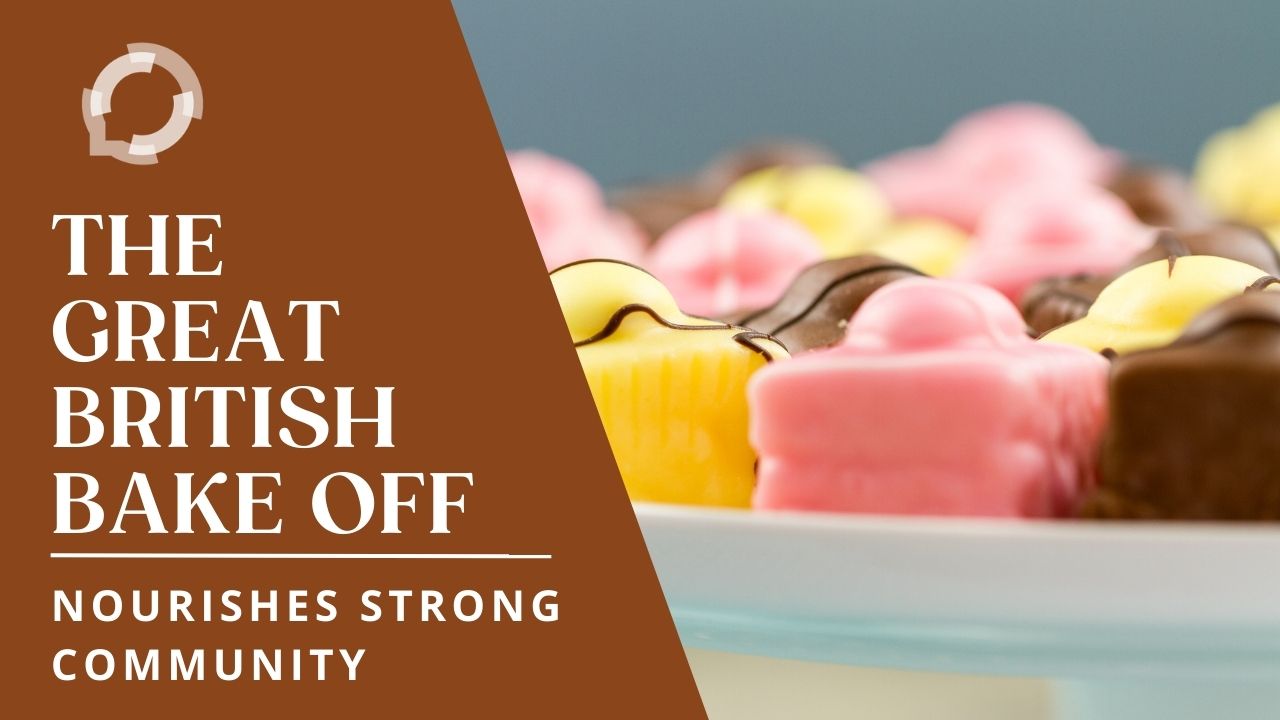Series 14 of The Great British Bake Off (or, as it’s known in U.S. broadcasts, The Great British Baking Show, because the Pillsbury company owns the copyright to “bake off”) comes to a rousing conclusion tomorrow night. Which of this series’ three remaining contestants will win? Dan’s been a consistent, strong performer throughout the season. Josh has been steadily improving under the watchful eye of his beloved grandma’s photo. Matty is a dark horse candidate who has suddenly emerged from the pack in the past two episodes.
Why am I writing about GBBO on this decidedly non-baking blog?
As much as I’m a fan of the show with firm opinions about each week’s bakes, its culture is what keeps me coming back. Particularly in contrast with similar United States-based shows, GBBO, like its crafty kin (The Great Pottery Throw Down, The Great British Sewing Bee, and Blown Away for glassblowing), is known for its genuinely supportive atmosphere. That authenticity comes through despite the fact that the show is heavily edited to compress a full weekend of baking into a one-hour episode.
Companies looking to foster a strong workplace environment should take a page from GBBO’s recipe book.
Start with Good Ingredients: Great British Bake Off Overview
GBBO is filmed on an estate in the English countryside, with the contestants and equipment in a large white tent. Fuzzy bumble bees and chirping birds add charm to the beautiful sweeping vistas. The show’s setting is meant to evoke the friendly baking challenges of a village fete, while working in a tent means that bakers are basically outside. Heat and humidity have wreaked havoc with numerous bakers’ best-laid plans. Umbrellas frequently drip in front of the camera during contestant interviews outside the tent.
The amateur bakers complete three challenges per episode, with two judges eliminating one contestant each week until three remain for the final. Contestants are judged for their flavors, textures, creativity, and consistency. Two hosts, also called presenters, provide color commentary and comic relief during the bakes. Each week has a theme, and bakers practice two of the challenges beforehand. On the other hand, they learn about each Technical Challenge only as they’re about to start it; each contestant is provided with identical ingredients and an ultra-minimalist recipe to follow. The resulting bakes are judged without knowing who made each entry.
Tried & True or Something New: Balance is Essential
GBBO has favorites as well as fresh ideas. Bread, biscuits (that is, cookies), cake, and patisserie, the major staples of skilled baking, feature every season. All contestants want to win, but many say that having judge Paul Hollywood, who’s particularly famous for his breadmaking, say nice things about their bread is a highlight of their time in the tent.
To keep the show from being predictable, however, producers rotate in one or two new themes each season. Series 4 featured Alternative Ingredients for week 8, Series 10 had a Roaring 20s theme for week 5, while Series 13 had Custards in week 7. How will an unusual theme affect the standings? Will a leading baker rise to the occasion or deflate under pressure? Will contestants ever have made recipes on the theme before GBBO and can they pull off the unfamiliar bakes? Some ideas work better than others and that uncertainty brings dramatic tension to the overall season.
Thankfully, producers have also learned what does not work at all. Series 14 has moved away from nationality week, which had previously resulted in racist stereotypes rather than genuine recipes from the featured country. Diversity in name only is meaningless – at best – and deeply offensive most of the time.
Balance also comes to the fore in the bakers’ flavors. Some will go for classic combinations like orange and cinnamon, whereas others will add matcha or rosewater to bring in a different flavor profile. Whether familiar or original, the most successful flavor combinations work together for a multi-sensory experience of sight, smell, and taste. If any one ingredient crowds out the others, the bake is less successful.
Mix Well: Community before Competition
One of the most endearing aspects of GBBO is the way that the bakers help each other. As the final seconds of a challenge tick down, someone who’s finished will rush over to help another carefully slide their elaborate bake onto the presentation tray. Bakers routinely offer words of encouragement when something goes wrong and fistbumps of celebration for a good set of judging comments. While there have been some accidents that have affected contestants’ bakes across the show’s 14 seasons, they are relatively few. The overall vibe of the show is one of mutual support and encouragement.
Community featured in series 14 in a different way, as well. Tasha Stones is the show’s first deaf contestant, and her British Sign Language interpreter, Daryl, was often onscreen with her. Host Noel Fielding introduced Daryl in the first episode, and Tasha said that the show was dedicated to “ensuring [she] had the same access as the other bakers.”
The finale highlights how important community is to GBBO by bringing back all of the season’s former contestants as well as family and friends of the finalists for a grand picnic. There are games and of course, everyone gets to sample the last set of bakes. When contestants say that they’ve made lifelong friends, they mean it. Some series end with an update about how the bakers are staying in touch after filming.
Taste of Success: Substance over Style
Artistry, creativity and resourcefulness are important, particularly for the Showstopper Challenge that’s meant to be an elaborate centerpiece item. The judges want to see the bakers taking some risks and they definitely take note of how each bake looks before slicing into it. Patisserie should be very neat; a theme associated with childhood might be more brightly colored than one that’s not. Sloppiness, especially the sort that indicates a baker didn’t manage their time well, can lower the judges’ assessment.
But no matter how glossy a mirror glaze or perfectly piped a border, if a bake doesn’t taste good, it won’t win the challenge. The inverse is also true. Delicious flavor and appropriate texture often redeem a lackluster visual presentation.
Contestants each have their ups and downs across the series, but the three in the final consistently execute their bakes to the highest level of quality.
How about you?
Are you a fan of The Great British Bake Off? Do you pine for an oven whose door slides down out of the way, like I do? What lessons from the tent do you see in other workplaces? How does a company’s environment affect its staff?
Who’s your pick to win series 14? I think Dan’s longer baking experience and overall steadiness will edge out Josh and Matty.
Check Out Our YouTube Channel
The Rourke Training – Ongoing Mastery YouTube channel has a bit of something for everyone. Go there to get Kirsten’s take on examples of public speaking, as well as reflections on her entrepreneurial journey. The channel is also the home of the podcast Kirsten and Kellie produced for 5 years, Ongoing Mastery: Presenting & Speaking, which covers everything connected to continually improving your craft of being a public speaker, from interviews and mini-coaching sessions with guests to conversations between Kirsten and Kellie.
Come join us. Cheers, Kellie


